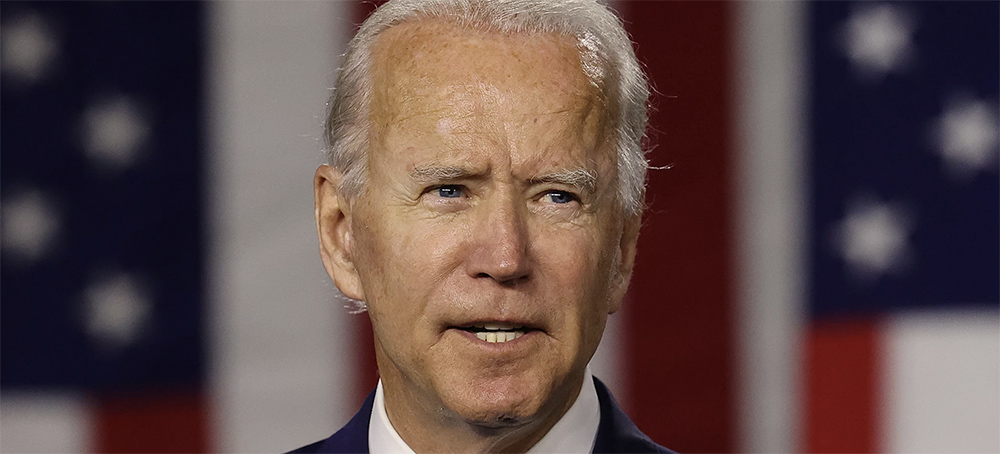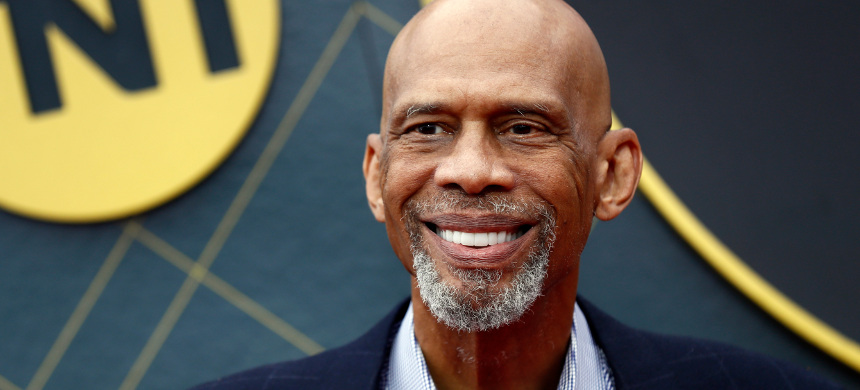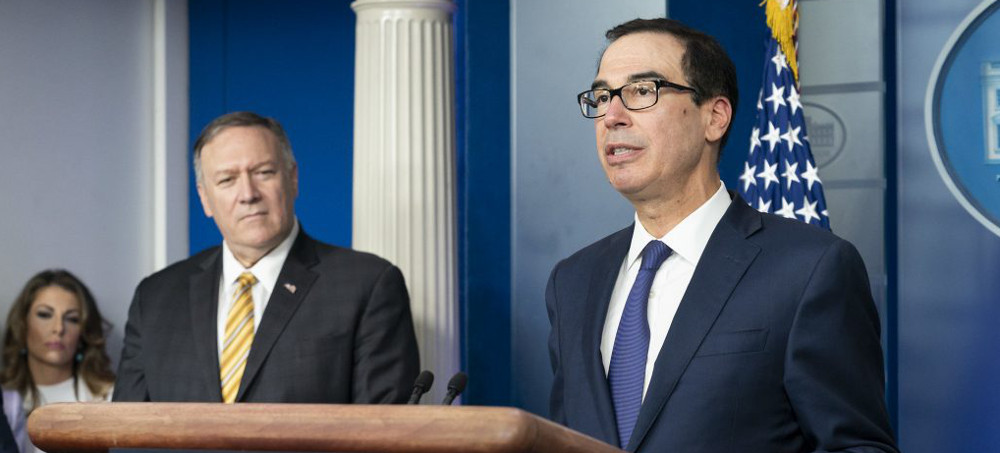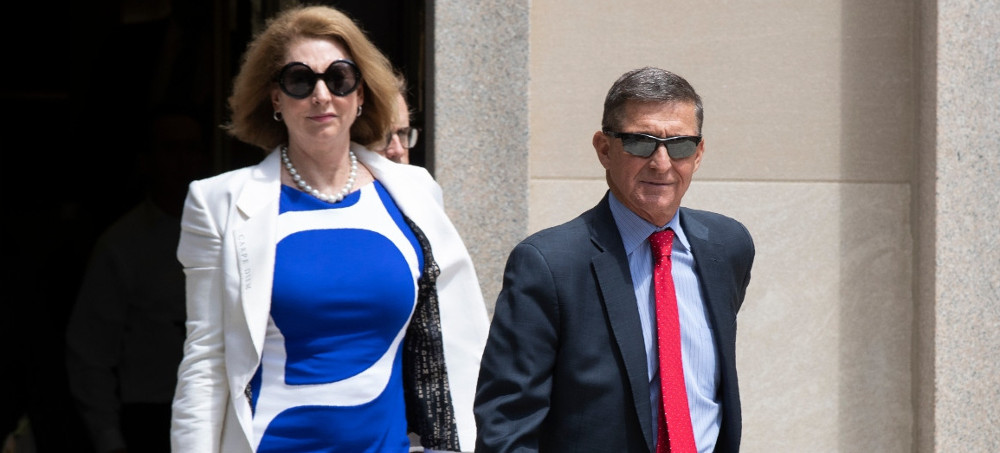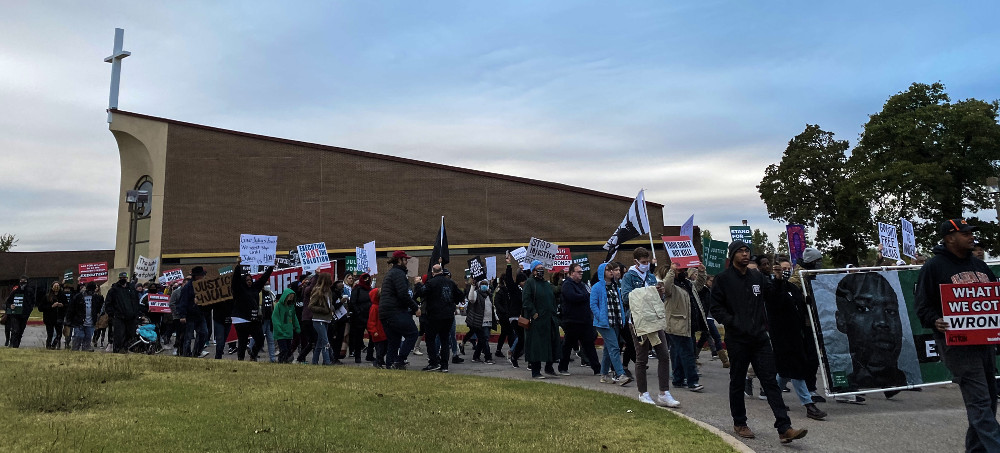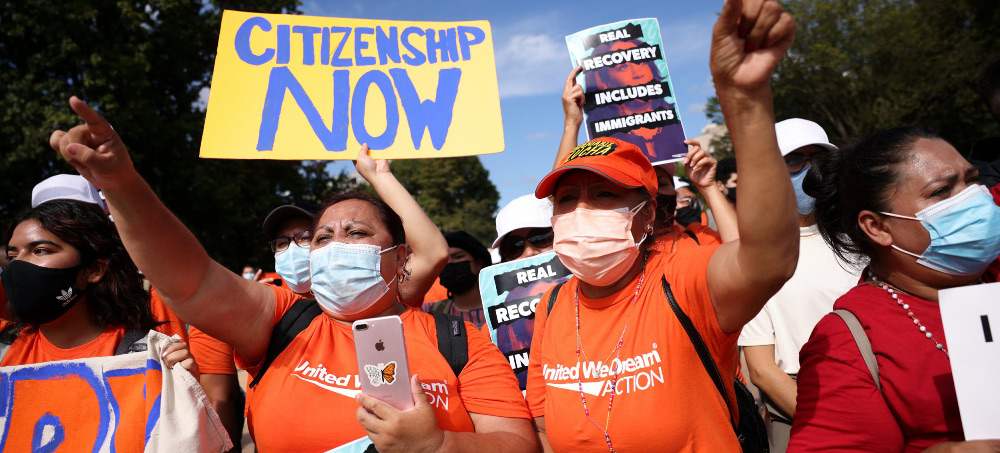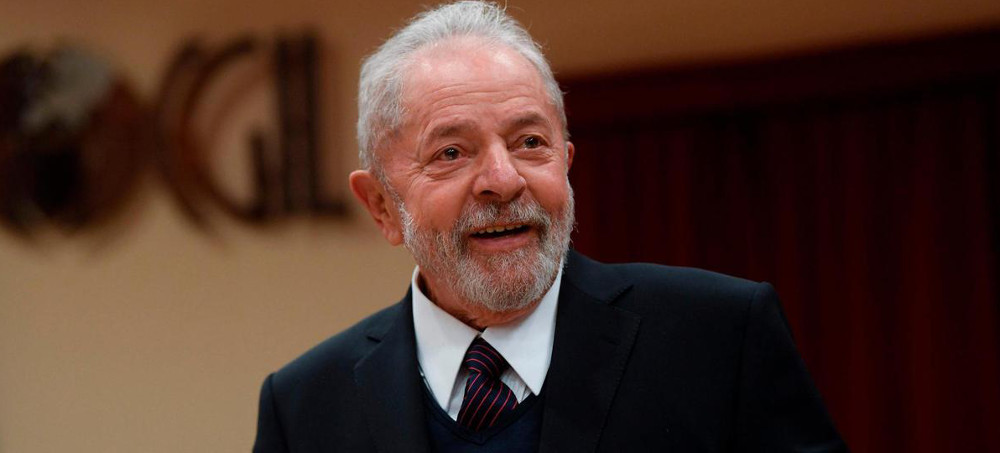
10 November 21
Live on the homepage now!
Reader Supported News
PEOPLE WILL IGNORE FUNDRAISING TODAY UNLESS WE FIGHT — It’s a terrific day for readership, but that won’t mater. If we do not make a determined stand for the basic funding RSN needs to do all of this — We Will Not Get It, period. Unfair, but very real. We will fight. It’s what we do.
Marc Ash • Founder, Reader Supported News
Sure, I'll make a donation!

Charles Pierce | Here's a Plan for the Extraction Industries: Clean Up Your Own Mess
Charles Pierce, Esquire
Pierce writes: "One of the most easily understood, but almost never enacted, concepts in environmental protection is that you should clean up your own mess."
ALSO SEE: Cortez Masto Pushes Mine Royalties
Out of Reconciliation Bill
Did none of these oil executives go to kindergarten?
One of the most easily understood, but almost never enacted, concepts in environmental protection is that you should clean up your own mess. Your oil company poisons the groundwater, or your pipeline bursts in someone else’s pasture, you pay to make the folks whole again. How is this not the simplest form of justice short of a punch in the nose? Yet, the extraction industries have spent millions of dollars, and thousands of billable hours, devising ways to stick the American taxpayer with the bill for their malfeasance—or, at the very least, tennis-shoe’ing their own responsibility by ducking into bankruptcy, or into a maze of shell corporations and offshore holding companies.
(Which reminds me. Frontline is running a special on Tuesday night about our good friends at the International Consortium of Investigative Journalists and their work with the Pandora Papers. Blog says check it out.)
Down in North Carolina, however, the company responsible for a massive gasoline leak—kids on ATVs discovered it because gasoline was bubbling out of the ground—has found an even simpler way around its responsibility. Apparently, it has decided that it’s cheaper to buy all the land that its gasoline wrecked than to immediately clean it up. From NC Policy Watch:
Colonial Pipeline has bought yet more property in Huntersville, near the site of North Carolina’s largest gasoline spill in history — 25.8 acres for nearly $1.7 million, according to Mecklenburg County real estate records. This brings the total spent by the company on property buyouts near the spill site to roughly $2.5 million. The purchase, which occurred in September, includes land, a house and a barn on Huntersville-Concord Road, just feet from the Oehler Nature Preserve, where a pipeline leak discharged at least 1.3 million gallons of gasoline into the groundwater in August 2020.
The company claims that it’s buying the land to clean it up, and it can pretty much money-whip most of the current landowners into selling off their property. But these transactions also mean that the company can take its own sweet time about it. And the state authorities are already looking on the cleanup activities with a decidedly skeptical squint.
Colonial Pipeline says no drinking water wells have been contaminated; however, state environmental officials have directed the company to extend residential private well sampling radius an additional 500 feet, to 2,000 feet from the spill site. Petroleum contamination has been found beneath the water table. These are the latest acquisitions by Colonial, which began buying out private landowners a year ago. At that time, the company had bought three houses and their acreage near the spill site for nearly $1 million.
I don’t know what’s more aggravating—the arrogance of the company’s believing that its endless bankroll can buy its way out of anything, or the complete confidence with which the company acts as though it can.
Meanwhile, down in the eternal environmental catastrophe that is Louisiana, some oil executives had themselves a golf outing on Monday. There to greet them were some protestors demanding answers to the problem of abandoned oil wells. The protest was piped over to the climate summit in Glasgow, and the lead speaker was General Russel Honoré, the man who finally straightened out the mess left behind in New Orleans by Hurricane Katrina. The oil companies, Honoré pointed out, are getting $21 billion from the new infrastructure bill to clean up the abandoned wells that are leaking methane into the atmosphere at alarming rates. In other words, we’re all paying to clean up their mess. From The Advocate newspapers:
Honoré said Louisiana is "run by an oil oligarchy," and said it is "as close to a Putin government as you can get.” … Honoré also said some large companies working in Louisiana sell their depleted wells to smaller, limited liability companies which, in turn, extract the last of the oil from them and then declare bankruptcy, leaving the wells uncapped and the state with a clean-up site…Honoré also said Louisiana should not let members of the industry sit on the Oilfield Site Restoration Commission, which he said presents a conflict of interest. Steve Maley, vice president of operations for Badger Oil Corp. in Lafayette, recently said removing industry representatives from the commission would deprive it of needed expertise.
Yeah, that’d be tragic.
Clean up your own mess.
Seriously, did none of these people go to kindergarten?
READ MORE
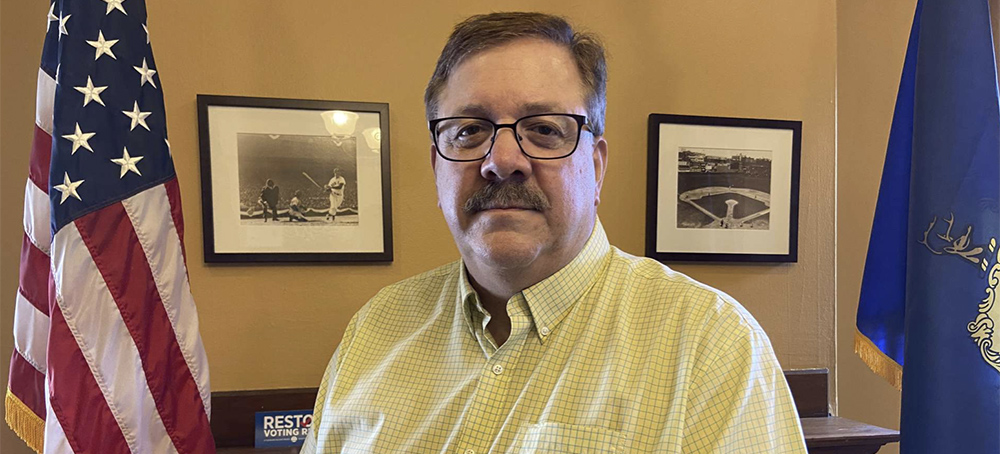 'ON EDGE': Vermont Secretary of State Jim Condos says staffers in his office have been rattled by a series of threats. (photo: Linda So/Reuters)
'ON EDGE': Vermont Secretary of State Jim Condos says staffers in his office have been rattled by a series of threats. (photo: Linda So/Reuters)
Reuters Unmasks Trump Supporters Who Terrified US Election Officials
Linda So and Jason Szep, Reuters
Excerpt: "Law enforcement has taken little action as backers of Donald Trump aim stark threats at election officials. Reuters tracked down nine of the harassers. Most were unrepentant."
Law enforcement has taken little action as backers of Donald Trump aim stark threats at election officials. Reuters tracked down nine of the harassers. Most were unrepentant.
In Arizona, a stay-at-home dad and part-time Lyft driver told the state’s chief election officer she would hang for treason. In Utah, a youth treatment center staffer warned Colorado’s election chief that he knew where she lived and watched her as she slept.
In Vermont, a man who says he works in construction told workers at the state election office and at Dominion Voting Systems that they were about to die.
“This might be a good time to put a f‑‑‑‑‑‑ pistol in your f‑‑‑‑‑‑ mouth and pull the trigger,” the man shouted at Vermont officials in a thick New England accent last December. “Your days are f‑‑‑‑‑‑ numbered.”
The three had much in common. All described themselves as patriots fighting a conspiracy that robbed Donald Trump of the 2020 election. They are regular consumers of far-right websites that embrace Trump’s stolen-election falsehoods. And none have been charged with a crime by the law enforcement agencies alerted to their threats.
They were among nine people who told Reuters in interviews that they made threats or left other hostile messages to election workers. In all, they are responsible for nearly two dozen harassing communications to six election officials in four states. Seven made threats explicit enough to put a reasonable person in fear of bodily harm or death, the U.S. federal standard for criminal prosecution, according to four legal experts who reviewed their messages at Reuters’ request.
These cases provide a unique perspective into how people with everyday jobs and lives have become radicalized to the point of terrorizing public officials. They are part of a broader campaign of fear waged against frontline workers of American democracy chronicled by Reuters this year. The news organization has documented nearly 800 intimidating messages to election officials in 12 states, including more than 100 that could warrant prosecution, according to legal experts.
The examination of the threats also highlights the paralysis of law enforcement in responding to this extraordinary assault on the nation’s electoral machinery. After Reuters reported the widespread intimidation in June, the U.S. Department of Justice launched a task force to investigate threats against election staff and said it would aggressively pursue such cases. But law enforcement agencies have made almost no arrests and won no convictions.
In many cases, they didn’t investigate. Some messages were too hard to trace, officials said. Other instances were complicated by America’s patchwork of state laws governing criminal threats, which provide varying levels of protection for free speech and make local officials in some states reluctant to prosecute such cases. Adding to the confusion, legal scholars say, the U.S. Supreme Court hasn’t formulated a clear definition of a criminal threat.
For this report, Reuters set out to identify the people behind these attacks on election workers and understand their motivations. Reporters submitted public-records requests and interviewed dozens of election officials in 12 states, obtaining phone numbers and email addresses for two dozen of the threateners.
Reuters was able to interview nine of them. All admitted they were behind the threats or other hostile messages. Eight did so on the record, identifying themselves by name.
In the seven cases that legal scholars said could be prosecuted, law enforcement agencies were alerted by election officials to six of them. The people who made those threats told Reuters they never heard from police.
All nine harassers interviewed by Reuters said they believed they did nothing wrong. Just two expressed regret when told their messages had frightened officials or caused security scares. The seven others were unrepentant, with some saying the election workers deserved the menacing messages.
Ross Miller, a Georgia real-estate investor, warned an official in the Atlanta area that he’d be tarred and feathered, hung or face firing squads unless he addressed voter fraud. In an interview, Miller said he would continue to make such calls “until they do something.” He added: “We can’t have another election until they fix what happened in the last one.”
The harassers expressed beliefs similar to those voiced by rioters who stormed the U.S. Capitol on January 6, trying to block Democrat Joe Biden’s certification as president. Nearly all of the threateners saw the country deteriorating into a war between good and evil – “patriots” against “communists.” They echoed extremist ideas popularized by QAnon, a collective of baseless conspiracy theories that often cast Trump as a savior figure and Democrats as villains. Some said they were preparing for civil war. Six were in their 50s or older; all but two were men.
They are part of a national phenomenon. America’s federal elections are administered by state and local officials. But the threateners are targeting workers far from home: Seven of the nine harassed officials in other states. Some targeted election officials in states where Trump lost by substantial margins, such as Colorado – or even Vermont, where Biden won by 35 percentage points.
“These people firmly believe in the ‘Big Lie’ that the former president legitimately won the election,” said Chris Krebs, who ran the Cybersecurity and Infrastructure Security Agency at the Department of Homeland Security. Krebs was fired by Trump last year for declaring that the 2020 election had been conducted fairly. By terrorizing election officials, he said, they’re effectively acting as Trump’s “foot soldiers.”
A Trump spokesperson did not respond to requests for comment.
Representative John Sarbanes, a Maryland Democrat, introduced legislation in June to make it a federal crime to intimidate, threaten or harass an election worker. The bill, which has not come up for a vote, followed a Reuters investigation into such threats published the same month.
“I think we’re on a dangerous path,” Sarbanes said last week when told the threats were continuing with little law enforcement intervention. “We want there to be some effective and sustained push back on this kind of harassment.”
You’re “about to get f‑‑‑‑‑‑ popped”
Only one of the nine harassers Reuters interviewed wouldn’t reveal his identity: the man threatening Vermont officials. Before reporters started examining him, law enforcement officials had decided against investigating, as many other agencies have done in similar cases nationwide.
Late last year, between Nov. 22 and Dec. 1, he left three messages with the secretary of state’s office from a number that state police deemed “essentially untraceable,” according to an internal police email obtained through a public-records request. The man identified himself as a Vermont resident in one voicemail.
Police didn’t pursue a case on the grounds that he didn’t threaten a specific person or indicate an imminent plan to act, according to emails and prosecution records. State police never spoke with the caller, according to interviews with state officials, a law enforcement source and a review of internal police emails.
Reuters did.
Reporters connected with him in September on the phone number police called untraceable. In five conversations over four days spanning more than three hours, he acknowledged threatening Vermont officials and described his thinking.
He soon grew agitated, peppering two Reuters reporters with 137 texts and voicemails over the past month, threatening the journalists and describing his election conspiracy theories.
The man telephoned the secretary of state’s office again on Oct. 17 from the same phone number used in the other threats. This time he was more explicit. Addressing state staffers and referring to the two journalists by name, he said he guaranteed that all would soon get “popped.”
“You guys are a bunch of f‑‑‑‑‑‑ clowns, and all you dirty c‑‑‑suckers are about to get f‑‑‑‑‑‑ popped,” he said. “I f‑‑‑‑‑‑ guarantee it.”
The officials referred the voicemail to state police, who again declined to investigate. Agency spokesperson Adam Silverman said in a statement that the message didn’t constitute an “unambiguous reference to gun violence,” adding that the word “popped” – common American slang for “shot” – “is unclear and nonspecific, and could be a reference to someone being arrested.”
Legal experts didn’t see it that way. Fred Schauer, a University of Virginia law professor, said the message likely constituted a criminal threat under federal law by threatening gun violence at specific individuals. “There’s certainly an intent to put people in fear,” Schauer said.
After Reuters asked Vermont officials about the October threat, the Federal Bureau of Investigation began an inquiry into the matter, according to two local law enforcement officials.
The FBI declined to confirm or deny any investigation into that threat and others reported in this story. In a statement, the bureau said it takes such acts seriously, working with other law enforcement agencies “to identify and stop any potential threats to public safety” and “investigate any and all federal violations to the fullest."
‘I’m a patriot’
Many of the harassers have been radicalized by a growing universe of far-right websites and other sources of disinformation about the 2020 election. Like Trump, they bashed mainstream news outlets and cast them as complicit in an elaborate scheme to steal the election.
Jamie Fialkin of Peoria, Arizona, talked of a grand conspiracy of those controlling the media, the banking system and social media companies. “When you have those three things, you can get away with anything – you can tell people, ‘black is white, white is black,’ and people go, ‘OK,’” Fialkin said.
On the surface, nothing about Fialkin’s biography suggests extremism. A former stand-up comedian from Brooklyn, New York, Fialkin said he has a degree in actuarial science, the study of insurance data. In 2017, he self-published a book marketed as a “survival guide” for first-time older parents. The 54-year-old said he spends most days taking care of his two young daughters and driving part-time for Lyft.
At a 2006 comedy show, he poked fun at his “professional bowler” physique, balding head, and inability to play golf. The self-described Orthodox Jew also took aim at Palestinians and described his political views as “a little more to the right.”
Fialkin said in an interview that he’s no longer in a joking mood.
He believes America is headed for civil war. He endorsed Trump’s false claims that millions of fraudulent votes swung the election to Biden. He said he’s convinced that former President Barack Obama, a Democrat, and progressive philanthropist George Soros bought fake ballots from China, another debunked theory promoted by Trump’s allies.
Fialkin blamed one person in particular for Trump’s Arizona loss: Secretary of State Katie Hobbs, the state’s top election official. On June 3, Fialkin called Hobbs’ office and left a message saying she’d hang “from a f‑‑‑‑‑‑ tree.”
“They’re going to hang you for treason, you f‑‑‑‑‑‑ bitch,” Fialkin said.
Minutes later, Fialkin left another voicemail in which he recommended a “good slogan” for Democrat Hobbs’ campaign for governor: “Don’t vote for me, for one reason. Back in December, I got hung for treason.”
Fialkin said he never intended to harm Hobbs, but was unapologetic.
“I’m not denying anything,” he said, “because I’m a patriot.”
Fialkin said he changed his Republican voter registration to independent because the party didn’t fight hard enough for Trump.
“I’m like most Americans,” he said. “We’re just waiting to see when the civil war starts.”
Fialkin’s messages were part of a barrage targeting Hobbs. Two others came from Jeff Yeager, a 56-year-old self-employed electrician from Los Angeles, California. Yeager, too, called for her execution.
“When Katie the c‑‑‑ is executed for treason, what are you f‑‑‑‑‑‑ traitors going to be doing for work?” Yeager said in a June 17 voicemail left for Hobbs and her staff. Months later, on Sept. 8, he left another voicemail warning she’d be executed.
Yeager acknowledged leaving the messages and said he didn’t care if Hobbs felt threatened. “If she thinks that I’m a threat to her, I’m not,” he said. “But the public is going to hang this woman.”
Yeager said he sees the mainstream media as full of disinformation; he called Reuters “one of the most evil organizations on the planet.” He said he gets his news from “alternative websites that are not censored,” including social network Gab and Bitchute, a video-sharing site known for hosting far-right figures and conspiracy theorists.
“Everything we’re being told is a lie,” he said.
In an interview, Hobbs said the threats by Fialkin, Yeager and others have been “emotionally draining” for her and her staff. The messages from Fialkin and Yeager were sent to the FBI, her spokesperson said. Some threats triggered a security detail, Hobbs said.
Jared Carter, a Cornell University law professor specializing in constitutional free-speech issues, said the threats by both men could be prosecuted under federal law. “In light of the multiple voicemails from the same person, and the overall tone of the messages, a court could find them to be true threats,” Carter said.
Election administrators such as Hobbs are part of a broader array of public officials targeted by Trump supporters. The day before Yeager spoke with Reuters in September, he said, two FBI agents visited him at his Los Angeles home to discuss threats he made to two national politicians: Republican Senator Mitt Romney and Democratic House Speaker Nancy Pelosi, both of whom denounced Trump for inciting the January 6 insurrection. He said the FBI agents produced transcripts of his calls to Pelosi and Romney. Yeager said the transcripts quoted him as saying “we will kill you.”
The agents instructed him how to lawfully express his political views, Yeager said, and left without arresting him. “I’m not making any more calls to anybody,” he said. “I may have crossed the line in one sentence, but I’m no danger to anybody.”
Spokespeople for Romney and Pelosi declined to comment on Yeager’s threats.
Inspired by Trump
Others who threatened election officials told Reuters they were directly inspired by Trump or his prominent allies, who have denounced specific election offices nationwide for allowing voter fraud, turning them into targets.
Eric Pickett, a 42-year-old night staffer at a youth treatment center in Utah, said his anger boiled over after watching an Aug. 10 “cyber symposium” held by pillow magnate Mike Lindell, a Trump ally who has pushed false election conspiracy theories.
Pickett said he paid close attention as one of the symposium’s speakers, Tina Peters, a Republican clerk in Colorado’s Mesa County, criticized Colorado Secretary of State Jena Griswold, a Democrat. Griswold has been leading an investigation into Peters over a voting-system security breach in Mesa, one of the state’s most conservative counties. At the symposium, Peters, an election-fraud conspiracy theorist, claimed Griswold “raided” her office to produce false evidence and “bully” her.
None of that was true, according to state officials. Nonetheless, Pickett snapped. He got on Facebook and sent Griswold a message.
“You raided an office. You broke the law. STOP USING YOUR TACTICS. STOP NOW. Watch your back. I KNOW WHERE YOU SLEEP, I SEE YOU SLEEPING. BE AFRAID, BE VERRY AFFRAID. I hope you die.”
A Griswold spokesperson said the August message was promptly referred to state and federal law enforcement. The threat was reported by Reuters in September.
Pickett said in an interview that he “got wrapped up in the moment.” He was surprised Griswold found the message threatening and expressed regret for causing alarm.
“I didn’t know they would take it as a threat,” he said. “I was thinking they would just take it as somebody just trolling them.”
Colorado State Patrol, in response to a records request, said they had no investigative reports on the threat. A spokesperson, Sergeant Troy Kessler, said the State Patrol reviewed all messages it received from Griswold’s office and that no one had been arrested.
Three legal experts said the message met the threshold of a threat that could be prosecuted under federal law. “The whole purpose of the threats doctrine is to protect people from not only a prospect of physical violence, but the damage of living with a threat hanging over you,” said Timothy Zick, a William … Mary Law School professor.
Lindell and Peters did not respond to requests for comment.
Tarred and feathered
Trump’s stolen-election claims about Georgia, traditionally a Republican stronghold, have sparked some of the most serious election threats.
In a Dec. 10 hearing organized by Georgia Republican lawmakers, Trump lawyer Rudy Giuliani played a short snippet of surveillance footage from Atlanta’s State Farm Arena, which was used as a tabulation site. He claimed it showed Fulton County election workers pulling out suitcases full of fraudulent ballots in Biden’s favor. State investigators and county officials have said the “suitcases” were standard ballot containers and the video shows normal vote-counting.
Ross Miller, the real-estate investor in Forsyth County, Georgia, saw the video. He left a Dec. 31 voicemail for Fulton County Elections Director Richard Barron, saying he “better run” and that he’ll be tarred and feathered and executed unless “ya’ll do something” about voter fraud. Barron forwarded the threat to police, according to a county email.
However, Fulton County Police Chief Wade Yates said his agency did not contact Miller after concluding the message did not constitute a threat under Georgia law.
In an interview, Miller acknowledged making the call.
“I left the message because I’m a patriot, and I’m sick and tired of what’s going on in this country,” he said. “That’s what happens when you commit treason: You get hung.”
Miller, who said he was in his sixties, said he’s been kicked off Twitter seven times for his views. He follows “Tore Says,” a podcast popular with QAnon adherents whose host, Terpsichore Maras-Lindeman, has called for a “revolutionary movement.”
“You’ve got to stand up,” said Miller. “You’re either a patriot for the freedom of this country or you’re a communist against it.”
‘You’re all f‑‑‑‑‑‑ dead’
Some Vermont officials questioned why the man intimidating state officials wasn’t investigated or prosecuted, highlighting a broader national debate over how to respond to post-election threats. In a pattern seen across America, Vermont law enforcement officials decided this man’s repeated menacing messages amounted to legally protected free speech.
The threatener focused on one of the central conspiracy theories promoted by Trump and his allies: That officials had rigged vote-counting technology from Dominion Voting Systems to flip millions of votes to Biden.
“Just let everybody know that their days are f------ numbered,” he said in a Dec. 1 voicemail. “There are a lot of people who are going to be executed.”
Around that time, officials at Dominion’s headquarters in Colorado received three unsettling voicemails. “You’re all f‑‑‑‑‑‑ dead,” said one message. “We’re going to f‑‑‑‑‑‑ kill you all.” The caller’s telephone number and voice matched those on the Vermont threats.
The threats to Dominion were referred to the Denver Police Department and the FBI. Denver police failed to identify the caller, a department spokesperson said.
The Vermont secretary of state’s office is located in a historic 19th-century brick Queen Anne-style house in the capital of Montpelier. The staff helps register voters and administer elections in a state with one of America’s lowest rates of violent crime. The voicemails terrified some staffers.
“I had to try to calm people down,” Secretary of State Jim Condos said in an interview. “We were all on edge.”
After the Dec. 1 threats, Vermont Deputy Secretary of State Chris Winters expressed astonishment that police wouldn’t pursue the caller, according to emails between secretary-of-state officials and police obtained through a records’ request.
“I am trying to make sense of this,” Winters wrote in an email to Daniel Trudeau, the criminal division commander of the Vermont State Police. “If someone makes a veiled threat to come to the Secretary of State’s office and execute only the guilty ones on the election team, without naming names, they’ve not broken the law?” Winters added that he wanted to know “who we’re dealing with.”
Trudeau replied that he had consulted with other officers and didn’t see a crime, because the caller did not specify that he would come to the secretary of state’s office and did not say that he personally would execute anyone.
Vermont’s state police intelligence unit tried but failed to identify the caller. Police examined the number, which bore a Vermont area code, but said it was untraceable, according to an email between state police officials. The unit’s commander, Shawn Loan, wrote to Trudeau saying that the threats could be part of a “larger campaign” and the calls “may have been scripted.” He added that the caller used voice-over-internet technology. Two former FBI agents said such calls can be harder to trace than those made from landlines or cellular phones.
Loan was not immediately available for comment, a spokesperson said.
Vermont State Police didn’t pursue the threatener. Rory Thibault, the state’s attorney in Washington County, which includes Montpelier, supported Trudeau’s decision in a four-page Dec. 15 memo to state police. The messages were “protected speech,” Thibault wrote, because they were not “directed at a single person or official.” They were “conditional” on a “perception of malfeasance in the election process,” and the caller didn’t indicate he would personally inflict harm, he said.
Zick, the William … Mary professor, said a threat doesn’t necessarily have to single out a specific individual to be prosecuted under federal law. If someone calls in a bomb threat to Congress rather than to a specific senator’s office, for instance, “that’s still a threat.”
In an interview, Thibault said Vermont laws pose unique challenges for pursuing such cases because they offer greater protections for individual rights than federal laws. He added that the threats and the rise of extremist rhetoric are leading to a push for tougher anti-harassment laws.
Vermont State Representative Maxine Grad said she plans to introduce a bill in the January session aimed at broadening protections for people who have received criminal threats, such as election workers.
On Dec. 16, a day after the state’s attorney ruled out an investigation, the unidentified caller taunted Vermont election officials in a new voicemail. “All the traitors will be punished” in the “next few weeks,” he said. “Kill yourself now.”
This time, the caller used a different number that appeared to be a pre-paid “burner” phone.
Montpelier Police Chief Brian Peete was concerned. “Very disturbing,” he wrote to state police, security and secretary of state officials after reviewing the Dec. 16 threat. “Fits profile of someone who may act.”
Again, state police declined to investigate because the caller didn’t threaten a specific individual, according to police emails.
The phone numbers used by the caller left few clues about his identity. One reverse phone lookup service linked his number to Bennington, a town of about 15,000 people in southwest Vermont. Denver police couldn’t identify the caller, but found “decent information” linking the number to Bennington, according to a Denver Police Department report on the threats to Dominion.
Surrounded by the Green Mountains, the Bennington area is known for its picturesque farm houses, a towering Revolutionary War battle monument and blazing autumn foliage. Less known is that the rural, mostly white town and other parts of southern Vermont have seen a rise in Trump-inspired militia activity in recent years, residents and state officials say.
In April, the town agreed to pay a $137,500 settlement to Kiah Morris, the state legislature’s only black female elected official, who resigned in September 2018, following complaints that Bennington police failed to properly investigate racially motivated harassment against her. Morris declined to comment for this story.
The calls from the still-unidentified man threatening election officials and reporters were referred to the FBI, according to police emails.
Reuters first reached the man on Sept. 17. In a brief interview, he referenced the Dominion conspiracy theory. Asked for his name, he swore and hung up.
A week later, the journalists contacted him again on the same number. He admitted leaving the voicemails to express his “absolute dissatisfaction” in the election. In three subsequent phone interviews on Oct. 6 and 7 that spanned a total of two and a half hours, he opened up about his views.
The man said he believed thousands of fake ballots were cast in Arizona, repeating debunked claims. He said members of the media would face tribunals and be executed like the Nazi leaders who were hung after the Nuremberg trials in the 1940s and that perpetrators of election fraud would be sent to military prison.
He said he lived “in the woods,” and worked in construction. He didn’t own a gun, but said he had “a baseball bat and a machete.” He shared videos from the far-right website Bitchute and said he watched “all kinds of stuff that definitely needs to be investigated.”
Then he turned on the Reuters journalists.
In an Oct. 11 voicemail, he threatened to sue the reporters for obtaining his telephone number from state records. Over the next 25 days, he texted them 91 times, sharing misinformation on the origins of the coronavirus and other conspiracy theories. On Oct. 17, he left the new voicemails at the Vermont secretary of state’s office, including the one threatening that the reporters and election staffers would get “popped.”
The next morning, the caller followed up with more texts to the journalists. “I am going to destroy you and that is a threat.” In multiple texts, he said he would “ruin” the life of one of the reporters. On Oct. 30, he left two more voicemails for them. “You are all going to f‑‑‑‑‑‑ hang. I’m going to make sure of it,” said one. “Bad s‑‑‑ is gonna to happen to you,” said the other. “Your days are f‑‑‑‑‑‑ numbered.”
He also sent the reporters four messages with the same picture: a grainy black-and-white photograph of a public execution that has been shared widely in far-right social media, with a caption claiming it showed “members of the media” hanging in “Nuremberg, Germany.” (In fact, the photo was taken in Kiev, Ukraine, depicting Nazi officers being hung for war crimes.)
The man’s threats and the rise in extremism in Vermont and nationwide since the election are a concern for Peete and his small staff in the Montpelier Police Department.
“It’s something that keeps me and all of us here up at night,” the police chief said.
READ MORE
 Senior advisor for policy Stephen Miller, White House Press Secretary Kayleigh McEnany and White House Chief of Staff Mark Meadows waves to guests before they boarded Marine One on the south lawn of the White House on October 20, 2020 in Washington, DC. (photo: Tasos Katopodis/Getty Images)
Senior advisor for policy Stephen Miller, White House Press Secretary Kayleigh McEnany and White House Chief of Staff Mark Meadows waves to guests before they boarded Marine One on the south lawn of the White House on October 20, 2020 in Washington, DC. (photo: Tasos Katopodis/Getty Images)
House January 6 Committee Subpoenas Stephen Miller, Kayleigh McEnany and More Close Trump Allies
Zak Hudak, CBS News
Hudak writes: "The House select committee investigating the January 6 attack on the Capitol issued a new batch of subpoenas on Tuesday for 10 additional allies of former President Trump."
ALSO SEE: Trump White House Records Can Be Given
to Capitol Attack Panel, Judge Rules
The House select committee investigating the January 6 attack on the Capitol issued a new batch of subpoenas on Tuesday for 10 additional allies of former President Trump, including his former senior adviser Stephen Miller, body man Nicholas Luna and White House press secretary Kayleigh McEnany.
The subpoenas show that the committee is delving deeper into the actions of Mr. Trump himself leading up to and on January 6, as it demands information from those who surrounded him. The committee also demanded information from Mr. Trump's personal assistant, two of his special assistants, his deputy chief of staff and White House personnel director on January 6.
"The select committee wants to learn every detail of what went on in the White House on January 6th and in the days beforehand," Congressman Bennie Thompson, the committee's chair, said in a statement. "We need to know precisely what role the former president and his aides played in efforts to stop the counting of the electoral votes and if they were in touch with anyone outside the White House attempting to overturn the outcome of the election."
Thompson said that the committee was seeking information from Miller because the former senior advisor to the president said he was part of efforts to spread false information about alleged election fraud and to convince state legislatures to change the results.
Documents obtained by the select committee show that Molly Michael, one of Mr. Trump's former special assistants, forwarded an email to former acting Attorney General Jeffrey Clark with talking points about unsubstantiated claims of voting irregularities and forwarded other emails aimed at overturning the election results, Thompson wrote in a letter informing her the committee was issuing her a subpoena.
Several of those who were sent subpoenas were near Mr. Trump on the Ellipse on January 6 as he rallied supporters on January 6, including Miller, McEnany, former special assistant to the president Cassidy Hutchinson and former White House personnel director John McEntee.
The full list of people subpoenaed Tuesday are:
- Nicholas Luna, former president's personal assistant
- Molly Michael, former special assistant to the president and oval office operations coordinator
- Ben WIlliamson, former deputy assistant to the president and senior advisor to chief of staff Mark Meadows
- Christopher Liddell, former White House deputy chief of staff
- John McEntee, former White House personnel director
- Keith Kellogg, Vice President Pence's national security advisor
- Kayleigh McEnamy, former White House press secretary
- Stephen Miller, former senior adviser to the president
- Cassidy Hutchinson, former special assistant to the president for legislative affairs
- Kenneth Klukowski, former senior counsel to assistant attorney general Jeffrey Clark
The flurry of subpoenas follows a half dozen the committee issued Monday as it ramps up its investigation into why and how a group of Trump supporters broke into the Capitol and delayed the certification of the election.
The committee demanded records and depositions from the latest batch by late November and early December. It's not yet clear whether the witnesses will cooperate. The House last month found Steve Bannon in criminal contempt for failing to comply with a subpoena from the select committee, but Justice Department officials have not yet indicated whether they will prosecute him.
House Speaker Nancy Pelosi created the House select committee earlier this year to investigate the January 6 attack, when thousands of Trump supporters descended on the Capitol as Congress counted the electoral votes, a largely ceremonial final step affirming President Biden's victory. Lawmakers were sent fleeing amid the riot, which led to the deaths of five people and the arrests of hundreds more. Mr. Trump, who encouraged his supporters to "walk over" to the Capitol during the Stop the Steal rally, was impeached by the House one week later for inciting the riot but was later acquitted by the Senate.
READ MORE
 Activists from Ocean Rebellion hold - and wear - oil cans in an Oct. 29 protest outside the COP26 climate meeting hall in Glasgow, Scotland. (photo: Peter Summers/Getty Images)
Activists from Ocean Rebellion hold - and wear - oil cans in an Oct. 29 protest outside the COP26 climate meeting hall in Glasgow, Scotland. (photo: Peter Summers/Getty Images)
Who Has the Most Delegates at the Climate Summit? The Fossil Fuel Industry.
Karla Adam and Harry Stevens, The Washington Post
Excerpt: "The prize for largest delegation went to the fossil fuel industry, which, as a whole, sent more delegates than any single country, according to the advocacy group Global Witness."
But while top oil executives are feeling unwelcome, many in the industry are in Glasgow to talk about carbon trading
The largest delegation at the COP26 climate summit does not belong to the United States, which is trying hard to reinstate itself as a climate leader, or to the United Kingdom, the host nation that pulled out the stops by adding Prince William and David Attenborough to its list of delegates.
The prize for largest delegation went to the fossil fuel industry, which, as a whole, sent more delegates than any single country, according to the advocacy group Global Witness.
Climate activist Greta Thunberg was not impressed. The Swedish teen tweeted, “I don’t know about you, but I sure am not comfortable with having some of the world’s biggest villains influencing … dictating the fate of the world.”
Conference arithmetic can be difficult. Almost 40,000 delegates registered for COP26 in Glasgow, making it the biggest COP in history, though the list doesn’t say how many actually showed up. And while Brazil sent 479 delegates to Glasgow, the largest team of negotiators at the summit, Global Witness and others analyzed a provisional delegate list published by the United Nations and found that 503 people linked, directly and indirectly, to the fossil fuel industry have been accredited for COP26.
This is larger than the combined total of delegates from Myanmar, Haiti, the Philippines, Mozambique, the Bahamas, Bangladesh and Pakistan, the regions and countries worst affected by climate change, the group said.
The United States sent 165 delegates, including former president Barack Obama, who was attending events on Monday. The United Kingdom sent 230.
Murray Worthy, the gas campaign leader at Global Witness, said the “presence of hundreds of those being paid to push the toxic interests of polluting fossil fuel companies will only increase the skepticism of climate activists who see these talks as more evidence of global leaders’ dithering and delaying.”
The group said its analysis found that some of the delegates with links to fossil fuel interests were parts of official country designations from Canada, Russia and Brazil. The researchers said that over 100 fossil fuel companies were represented at COP26, including Royal Dutch Shell, Gazprom and BP, as well as 30 trade associations and membership organizations.
Last month, Royal Dutch Shell announced that it wouldn’t be attending the summit.
“We were told that we were not welcome, so we will not be there,” said Ben van Beurden, the company’s chief executive, when answering questions on its third quarter earnings results.
His remarks came after he was confronted at a pre-COP26 event in Edinburgh by activists who walked on stage during his speech and said that Shell had no place speaking at the event.
Shell on Monday said that the company didn’t send any executive-level people, and that it didn’t sponsor a pavilion or host any events. The company did have a few climate specialists who were attending events at the margins of the conference.
According to the U.N. list, Shell sent six people and BP sent seven. Shell’s slate included a vice president for carbon capture, utilization and storage, and the head of climate policy and advocacy.
Van Beurden’s well-publicized comments sparked a debate about the role of fossil fuel companies in tackling climate change and the extent to which they should be included in climate talks.
Big oil and gas firms were effectively banned from sponsoring events at COP26 after organizers laid out their criteria. Sponsors had to not only set net-zero targets, which Shell and BP have done, they also had to show a “credible action plan to achieve this, independently verified through the science-based targets initiative.”
Some of those identified as fossil fuel lobbyists rejected claims that their presence would obstruct talks, arguing that they are working on finding market-based ways to reduce emissions. The biggest bloc identified by Global Witness was from the International Emissions Trading Association (IETA), which promotes markets for trading credits. They have 103 delegates in attendance.
Dirk Forrister, chief executive of IETA, said that about 25 percent of the delegates at COP were from energy and industrial sectors, like oil and gas, mining, chemical and electricity industries. The rest were people from “other parts of the carbon-market universe,” such as those working in finance.
He said most of his members have made net-zero pledges and that the companies were “working on transforming their businesses to meet the goals of the Paris agreement.”
“We support the whole ethos of the Paris agreement; it’s based on inclusivity,” he said. “There are many areas where business, government and NGOs are expected to work together to achieve the Paris ambition. We think cooperation is essential to get the result we want.”
Geoff Morrell, a spokesman for BP, said in an email that chief executive Bernard Looney opted not to travel to Glasgow because he didn’t want to become “a distraction from the important work going on at COP — although he honored a commitment by virtually participating in a panel discussion with Mary Robinson on the need for a Just Transition.”
Morrell said that a “handful” of BP colleagues were “invited to participate in events around COP, including the person leading our efforts to build Britain’s largest net zero industrial park. That is the extent of our involvement this year. No sponsorships. No hosting. No input.”
He added: “That’s unfortunate because in order to solve this monumental challenge you need [to] go where the emissions are and encourage those companies to green themselves — just as we are.”
Helen Mountford, vice president for climate and economics at the World Resources Institute, said “to be frank I have not been seeing many from the fossil fuel industry.” She said that while “it’s shocking that there is such a large number here and there are probably a number of discussions going on behind closed doors or in private spaces, you’re not actually seeing it or feeling it here.”
READ MORE
 Most migrants who arrive at the US-Mexico border trying to claim asylum are quickly expelled to Mexico or their country of origin under Title 42. (photo: Daniel Becerril/Reuters)
Most migrants who arrive at the US-Mexico border trying to claim asylum are quickly expelled to Mexico or their country of origin under Title 42. (photo: Daniel Becerril/Reuters)
US Immigration Advocates Say 'Congress Needs to Act' Amid New Migrant Arrivals
Jihan Abdalla, Al Jazeera
Abdalla writes: "A few thousand migrants, most of them fleeing poverty and violence in Central America and the Caribbean, set out from southern Mexico last month in hopes of reaching the United States."
Immigration advocates say US needs legislation to effectively respond to arrivals at border, but divisions run deep.
A few thousand migrants, most of them fleeing poverty and violence in Central America and the Caribbean, set out from southern Mexico last month in hopes of reaching the United States.
There is a strong possibility that Mexican authorities will block the group – which is travelling on foot – from coming close to the US-Mexico border, as per the terms of a deal between the two countries to stem irregular migration to the US.
But if the migrants do make it to the border, the US is likely to expel most of them under Title 42, a Trump-era policy that allows for immediate removals and that US rights groups, progressive leaders and the United Nations have blasted as a violation of international law.
President Joe Biden has kept the measure in place despite the criticism, as his administration struggles to respond to a 20-year high in the number of migrants and asylum seekers arriving at the US southern border.
It is not the first time the nation has faced challenges at the border, and it is unlikely to be the last, as immigration advocates say crises in Central and South American nations will continue to push thousands to seek protection in the US.
Those advocates now are calling on US legislators, bitterly divided along partisan lines on the issue, to pass legislation in Congress to reform the country’s immigration system, arguing that is the only way to respond in an effective and humanitarian manner.
“Immigration in this country is about politics, not about policy,” said Melanie Nezer, senior vice president for public affairs at HIAS, a US refugee resettlement agency. “It’s an intensely politicised issue, making it almost impossible to make good policy.
“The laws need to change,” she told Al Jazeera. “Congress needs to act; anything that the president does is temporary without Congress,” adding that Congress has to be a partner in the goal of protecting people in need.
Landmark bill
Immigration advocates say the last time Congress enacted sweeping changes to the US immigration system was in 1986 under former President Ronald Reagan.
The Immigration Reform and Control Act, which was hailed as a landmark immigration bill, made it a criminal offence for employers to hire undocumented migrants and offered legal status to nearly three million undocumented migrants who had been in the US prior to 1982.
The bill also included critical changes to policing at the US southern border, increasing funding for additional security technology and beefing up the number of border patrol agents. The measures, legislators argued at the time, would deter people from crossing without permits.
“It was the first time in recent history that the US embraced the notion that if we employ military force on our border we would dissuade people from even trying to cross the US border,” said Oscar Chacon, co-founder and executive director of Alianza Americas, a network of Latin American and Caribbean immigrant organisations.
“Clearly, that has not worked because it completely ignores why people are fleeing and because of that, it has been an outright failure and a terrible waste of public resources,” Chacon told Al Jazeera.
This fiscal year, US authorities detained 1.7 million migrants trying to cross the border – an all-time high – while the population of undocumented migrants living in the US has swelled to an estimated 11 million people.
Trump’s lasting legacy
Absent action by Congress, successive US administrations have enacted immigration policy through executive orders and Department of Homeland Security memos. Most of the measures, experts say, have been focused on increased policing.
The lack of action by Congress proved critical when former President Donald Trump, a Republican who made restricting immigration to the US one of his top goals, took office.
Starting in 2016, Trump signed executive orders that banned the entry of citizens of several Muslim-majority countries into the US, forced asylum seekers to wait in Mexico for their US immigration hearings, and increased deportations of undocumented migrants, among other measures. He also made building a wall with Mexico a hallmark of his immigration policies.
Amid continued gridlock on immigration in Congress, Biden reversed several of Trump’s policies by issuing his own executive orders after taking office in January.
But Trump’s hardline position on immigration has become entrenched in the Republican Party, political analysts say – and with Congress currently evenly divided between Republicans and Democrats, the prospect of passing meaningful immigration reform appears slim.
Experts say the last time Congress voted on comprehensive immigration reform legislation was in 2013 when the Senate passed a bill backed by former President Barack Obama with 68 votes in favour – including 14 Republicans – and 32 against. House Republicans refused to consider the bill, however, which would have made it possible for many undocumented immigrants to get on a path to citizenship.
Senate Republicans since then have increasingly opposed Democratic efforts at passing revisions to US immigration laws.
Recent surveys also show Americans are split along party lines when it comes to immigration. Seventy-five percent of Democrats compared with 41 percent of Republicans said they support admitting Central Americans fleeing violence and poverty into the US, an NPR/Ipsos poll released in September found.
“You can’t have the leader of one party turn immigration restriction or immigration expansion into their primary issue, without there being a partisan backlash against it by the other party,” said David Bier, an immigration policy analyst at the libertarian Cato Institute.
“It [immigration] was a big focus of his [Trump’s] campaign and while in office, he just applied his anti-immigrant agenda everywhere,” Bier told Al Jazeera.
Push for action
Ongoing efforts by members of Biden’s Democratic Party to include a pathway to citizenship for the majority of the 11 million undocumented immigrants living in the US as part of an ambitious $1.85-trillion, 10-year spending plan, have stalled due to Republican opposition. The proposal is unlikely to survive Senate rules that govern budget measures.
Instead, the bill is expected to include $100bn in funding for reducing “backlogs, expand legal representation, and make the asylum system and border processing more efficient and humane”, according to the White House.
Immigrant advocates say this is not enough, however.
They want Democrats in Congress to push for legislation that would, in addition to legalising undocumented migrants, grant pathways to citizenship to DACA recipients – migrants who were brought to the US as children – as well as for Temporary Protection Status holders and farmworkers.
They have also called on the US to reinstate its asylum system, which they argue is not functioning due to restrictive policies at the border, such as Title 42. Advocates say their demands are long overdue and would fulfil promises that the Biden administration campaigned on.
“Let’s make this clear. Democrats in Congress have not delivered on their promises to the immigrant community in decades!” RAICES, a pro-immigration, Texas non-profit, wrote on Twitter on Friday.
Meanwhile, amid overall declining approval ratings for Biden, 68 percent of Americans said they disapprove of his handling of immigration and the situation along the US-Mexico border, according to an ABC News/Ipsos poll published on October 31.
“There are people on the move worldwide, fleeing economic and global climate crises and our asylum system is not functioning in the way that it was intended to because the world has changed in the last 35 years,” said Nicole Melaku, executive director of the National Partnership for New Americans, an immigrant advocacy organisation.
She told Al Jazeera the US should consider passing legislation that would address current migration flows, such as designating new categories of migrants and asylum seekers to include climate refugees and people fleeing economic collapse.
“The world is changing right before our eyes and we don’t have the mechanism to address that change in real time,” Melaku said.
READ MORE
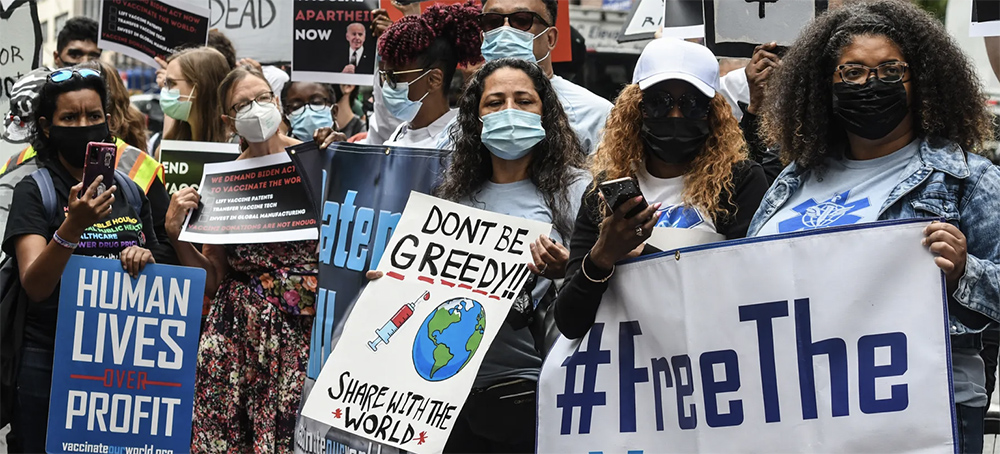 Demonstrators protest for global vaccine equality in New York on September 20. (photo: Stephanie Keith/Bloomberg/Getty Images)
Demonstrators protest for global vaccine equality in New York on September 20. (photo: Stephanie Keith/Bloomberg/Getty Images)
Why Are Rich Countries Still Monopolizing COVID-19 Vaccines?
Umair Irfan, Vox
Irfan writes: "Half the world has gotten a Covid-19 shot. Yet the vaccination rate in some countries is less than 10 percent."
Half the world has gotten a Covid-19 shot. Yet the vaccination rate in some countries is less than 10 percent.
About half of the world’s population has received at least one dose of a Covid-19 vaccine. The more than 7 billion shots administered so far are a massive, record-breaking public health achievement.
But more than 50 countries have vaccinated less than 25 percent of their populations. Vaccines aren’t distributed equally: Rich countries have about twice the population of low-income countries, yet they have received about 50 times as many Covid-19 vaccine doses, according to an October report from the People’s Vaccine Alliance. The countries with the lowest incomes generally have the lowest Covid-19 vaccination rates.
This vaccination gap is one of the key reasons the disease is still killing more than 6,000 people per day. It’s putting a strain on health systems in countries with already limited resources, fueling hospitalizations, deaths, and economic harm.
This isn’t just a humanitarian crisis, it’s a global threat to the fragile progress already made in the pandemic. The longer the pandemic rages, the greater the chances of a dangerous mutation in the coronavirus that causes Covid-19, which could then spread around the world.
Based on current trends, many countries will not have a majority of their people immunized against Covid-19 until well into 2022. Some of the poorest countries may not reach that point until 2023. So why exactly has the pace been so agonizingly slow?
Hoarding and production constraints are part of the story, but so are less-appreciated obstacles like clogged supply chains and breakdowns in communication between vaccine makers, donors, and recipients. These problems are solvable, however, and countries like the United States are uniquely positioned to contribute.
How to speed up international Covid-19 vaccine distribution
The World Health Organization has so far granted emergency approval of eight Covid-19 vaccines for international distribution. Many of these vaccines remain highly effective at preventing hospitalizations and deaths, including from highly transmissible variants of the virus that causes Covid-19.
Yet even in the best of circumstances, getting people vaccinated is a huge logistical challenge. The US, one of the world’s largest Covid-19 vaccine producers, has struggled with spoiled doses, confusing vaccination guidance, and misinformation. The US is still trying to convince holdouts to get their shots, despite the fact that most Covid-19 hospitalizations and deaths in the US are occurring among the unvaccinated.
“Even for the richest countries in the world, this is a really big lift,” said Lily Caprani, head of advocacy for health and pandemic response at Unicef, the world’s single largest vaccine buyer. “It’s been a real monumental, historic effort to get these rolled out.”
The Covid-19 pandemic has also wreaked havoc on global shipping and supply chains as economies rebound, demand for goods increases, and shipping companies cope with bottlenecks like crowded ports and trucker shortages. Vaccines, with their delicate handling requirements, as well as vital components like syringes, vials, and stoppers, have been particularly vulnerable to these disruptions.
All these hurdles get higher in countries that are unable to produce their own Covid-19 vaccines and have weaker health care systems.
If you add the stark inequities in global Covid-19 vaccine distribution, you end up with a deadly combination. In regions like sub-Saharan Africa, health officials are still struggling to get their hands on vaccines to protect workers on the front lines of the pandemic — while in the US, some adults are getting booster doses and shots are now available to children as young as 5.
The gaps in immunization go beyond vaccine production. “It’s not ‘supply’ in the sense that the world has produced enough vaccines to be able to protect at least front-line health care workers,” Caprani said. “It is a problem about how they are distributed and shared, which is extremely unequally.”
Misinformation and hesitancy around vaccines are problems in developing countries, too. However, the unmet demand for Covid-19 vaccines is vastly greater. “There’s far more people that desperately want to get one that can’t get one,” Caprani said.
In September, President Joe Biden set a goal of helping every country vaccinate 70 percent of its people by the fall of 2022. The US has pledged to donate 1.1 billion doses to other countries, and other wealthy countries have pledged hundreds of millions more. But deliveries so far have generally fallen drastically short of pledges.
To meet that 70 percent target, the pace of vaccination in low-income countries would have to increase to 19 times its current level, according to the Kaiser Family Foundation. This will require wealthy countries to produce and donate more vaccines, and to hugely scale up the infrastructure needed to deliver them.
Here are several ways countries with high vaccination rates can bolster the rollout elsewhere.
Demand transparency and communication from pharmaceutical companies
Countries that are counting on Covid-19 vaccine imports, whether through donations or purchases, are often in the dark about when and where rich countries and pharmaceutical companies will ship their doses, Caprani told Vox. Some donor countries have also favored certain low- and middle-income regions over others in donations so far.
“We need to know where are the doses, who made them, which factory, when are we going to get them,” she said. “Otherwise it slows the whole thing down.” Without this information, governments have a hard time getting personnel in place to administer vaccines and getting people in line to receive them.
For instance, the United Kingdom donated 9 million Covid-19 vaccine doses to low-income countries this summer, but several of the countries receiving them warned that they would not be able to distribute most of them in time. Many vaccines have a limited shelf life, and donated vaccines are often close to expiration. In May, Malawi was forced to discard 20,000 doses of Covid-19 vaccines because the country’s health system could not administer them before the shots expired.
Donate resources for the rollout, not just doses
Without robust health care systems in place, vaccination efforts can get even more expensive for developing countries as they aim to protect everyone from major cities to far-flung rural areas. “They need to recruit an army of vaccinators. They need to train them. They need to pay them. They need to equip them with PPE,” Caprani said.
Prior to the pandemic, the World Health Organization estimated that about half of the vaccines distributed around the world go to waste, largely due to problems with the cold chain. Many Covid-19 vaccines are particularly fragile, with strict cold-storage requirements. That means low-income countries either need to invest in large-scale cooling infrastructure or they are limited to vaccines that are more tolerant of higher temperatures.
Fixing all this takes money. Unicef launched the Access to COVID-19 Tools (ACT) Accelerator program to bridge the pandemic-response gap between wealthy and developing countries. Officials say the program needs an additional $23.4 billion to deploy a suite of tactics in developing countries including testing, treatment, and vaccines. According to Unicef, these measures could avert more than 5 million potential additional deaths and save the global economy more than $5.3 trillion.
That’s why Caprani argues wealthier countries should see their contributions less as donations and more as investments. “It’s a damn good investment,” she said.
Lift restrictive export bans
Countries that have pledged to donate vaccines are also struggling with their own epidemics. That’s created tension, and many vaccine-producing countries have decided to limit or ban exports. India, the world’s largest vaccine manufacturer, was initially expected to contribute Covid-19 vaccines to international vaccination efforts, but after a devastating wave of infections spurred by the delta variant of the coronavirus, India stopped donating and exporting vaccines, and even began importing them. That created a rupture in vaccination campaigns across other countries.
The US, the European Union, and others have also imposed export restrictions on critical supplies used to make vaccines, like chemicals and glassware. Many of these countries have made major strides in vaccinating their people, and advocates argue that it’s time for them to free up doses and raw materials for others to access. The WHO, and even some political leaders like French President Emmanuel Macron, have called on countries to drop export limits on vaccines and related supplies.
Macron said in March that the EU should block exports of vaccines until manufacturers had fulfilled their contracts with European countries. But in May, he told the US to take the opposite stance and “put an end to export bans not only on vaccines but on vaccine ingredients, which prevent production.”
In April, Adar Poonawalla, the head of India’s Serum Institute, the world’s largest vaccine manufacturer, publicly asked Biden to lift export controls on raw materials for vaccines.
Increase production
Initial estimates suggested that 10 billion to 11 billion doses would be enough to vaccinate the world’s 5 billion adults against Covid-19. But it’s becoming clear that more doses will be needed.
Several Covid-19 vaccines have shown that their protection can wane over time at least somewhat, so boosters may be necessary, particularly for older adults and people with preexisting health conditions. And some doses have gone to children, who are at lower risk than adults but can still experience severe Covid-19 and spread the coronavirus to some extent.
“Even in the United States, where most of the doses have been of the most effective vaccines, we’re already giving third doses,” said Chad Bown, a senior fellow at the Peterson Institute for International Economics who has been studying Covid-19 vaccine supply chains.
The urgency of booster shots is even higher “if you look at China or the places around the world that have administered the Chinese vaccines, which are less potent and have a greater need for additional dosage,” Bown added. “Arguably you need twice as many [doses] as we were thinking.”
Increasing the number of vaccine doses would also alleviate worries among vaccine-producing countries over whether they have enough doses for their own citizens as they fulfill their pledges abroad. So scaling up manufacturing even further is crucial to getting more Covid-19 vaccines to low-income countries.
This is one area where the US government can make an especially big impact as it procures vaccines from US-based suppliers. Using its leverage as a regulator and purchaser, the government could set terms for companies like Johnson … Johnson, Moderna, and Pfizer that spur them to invest even more in ramping up output. Moderna in particular has been accused of limiting much of its vaccine sales to wealthy countries, though the company says it is coping with its own production limitations and is not the only company facing criticism of vaccine deals.
“As policymakers, we should be writing contracts with these terms that say you need to double your production, triple your production of vaccines,” Bown said. That can include financing the construction of new vaccine production facilities and guaranteeing purchases. The government can also pressure manufacturers to sell more doses to low-income countries.
Experts predicted the vaccine gap. They still have a chance to close it.
What’s so frustrating about the vast and persistent chasm in Covid-19 vaccinations is that this was foreseeable, and the world has missed chances to stop these inequities in their tracks.
Covax, a global initiative that aimed to purchase and distribute 2 billion doses of Covid-19 vaccines for countries in need by the end of 2021, has only delivered 400 million doses across 145 countries. The program faced delays in funding, which meant that by the time it was ready to buy doses, most of the available production around the world was already reserved by countries that could afford them — and sometimes pay higher prices. (A large share of the doses Covax distributes are purchases, not donations.)
While Covax was constrained by money and vaccine supplies, countries like the US have been building up a massive vaccine stockpile. One recent estimate found that wealthy countries are on track to have 1.1 billion excess Covid-19 doses by early next year, very few of which are allocated for immediate donation. “A surplus of [hundreds of millions of doses] is so staggering that not sharing it with the world starts to look morally unjustifiable,” wrote Vox’s Sigal Samuel in May.
In a recent editorial in the Telegraph, Covax officials argued that the program should take priority with vaccine purchases they have negotiated with pharmaceutical companies. “Countries that have advanced sufficiently in their national programs should swap their place in manufacturers’ lines with Covax so that they can be put to work protecting the most vulnerable people in the world,” officials wrote.
If rich countries keep putting their own interests above the interests of the rest of the world, the world will continue to face a two-track pandemic, with some countries starting to return to normal while others remain under the threat of devastating outbreaks.
“We have not passed the test on solidarity,” Caprani said. The Covid-19 vaccination campaign may be a scientific triumph, she went on, but it has only served to “highlight and exacerbate the inequalities in the world — which is a sad indictment that even when it’s in our self-interest, we still as a world have failed to achieve that.”
And while pledges to donate vaccines are an important stop-gap, the world needs a more permanent solution to global health inequities, according to Georgetown University health policy researchers Ngozi Erondu and Renu Singh.
“Equitable vaccine access will come when there is equitable vaccine production,” they wrote in the Conversation. “There must be a particular emphasis on production capacity and increased access to technologies and knowledge transfer.”
There is still time to improve the global Covid-19 vaccination campaign, but speeding up further will require more forethought, planning, and generosity than has been shown to date. Covid-19 has shown itself to be a disease that does not respect national boundaries. Containing the pandemic wherever it lurks is in everyone’s interest.
READ MORE
 Wind farm. (photo: Max Mudie/Alamy)
Wind farm. (photo: Max Mudie/Alamy)
Report: The Renewable Future Is Being Built on Exploitation, Too
María Paula Rubiano A., Grist
Excerpt: "Fossil fuel companies have long been criticized for violating human rights. Turns out the renewable energy industry is just as bad."
Fossil fuel companies have long been criticized for violating human rights. Turns out the renewable energy industry is just as bad.
Eleven years ago, a human rights violation complaint arrived at the Business and Human Rights Resources Centre, or BHRRC. The London-based nonprofit monitors the activities of more than 10,000 companies around the world, and receives complaints about abuses every day. But this one was different: For the first time, the grievance involved a renewable energy project. Soon after, similar complaints began trickling in year after year. They warned that solar, wind, and hydroelectric companies were taking over land, restricting access to water, violating Indigenous people’s rights to prior and informed consent, and denying decent wages for workers.
Between 2010 and 2021, the center received more than 200 allegations of human rights violations linked to the renewable energy sector. “It became concerning,” said Mark Hays, a senior consultant at BHRRC.
Last year, Hays and his colleagues established a way to analyze and score the “human rights policies and practices” of 15 of the world’s biggest renewable energy companies. They found that on average, the companies scored just 22 percent for their human rights practices across their supply chains. Last week, the group released its second analysis, saying the findings “should set off alarm bells.”
Although there was a slight increase in the average score to 28 percent, that number still “implies major human rights risks for communities and workers,” the report says. “Abusive business models, and the loss of trust they generate, put at risk the much-needed energy transition our futures depend on.”
The abuses include land rights disputes in places like Chile and Ethiopia, and the killings of several Indigenous activists opposing a hydroelectric power plant in Guatemala. Other examples include the violation of the right to prior and informed consultation with Indigenous communities in Kenya, Mexico, and Morocco, among others; legal harassment against wind turbine opponents in Taiwan; and reports of underpaid migrant employees in offshore wind farms in Scotland.
“It’s a very interesting report, timely and relevant,” said Susana Batel, a researcher studying social justice issues in the energy transition at Lisbon University.
Researchers at the Business and Human Rights Resources Centre asked three basic questions: Do these companies explicitly recognize they have to respect human rights? Do they try to address potential conflicts before they happen? Do communities have mechanisms to be heard by the company — and will they receive relief in case a violation occurs?
Seven out of 15 companies scored more than 50 percent for their human rights policies, and eleven improved their performance compared to the first report. Iberdrola, the second-largest wind energy company globally, along with hydro, biomass, solar, and thermal energy producer Acciona Energy and Portugal-based utility company EDP, scored more than 80 percent in these basic indicators. NextEra, the world’s largest wind and solar energy company, state-owned Power China, and Georgia-based utilities company The Southern Company scored the lowest –all of them with less than 5 percent.
“[After the first report,] we heard positive remarks from some companies saying, this is actually helping us make the case internally for a stronger set of policies,” Hays said. “It’s clear by how they’ve altered their policies, they’ve really taken to heart some of the key guidance.”
Beyond these basic indicators, however, scores plummeted across the board. Researchers dug deeper, looking at factors that imagine “what a just renewable sector that fully embraces and realizes human rights could and should look like,” Hays said. They include labor rights of workers mining rare minerals and building the technologies in factories, the land rights of those impacted by the projects and its supply chain, the rights of environmental defenders living in the projects’ areas, the waste solar panels and turbines will generate once decommissioned. It also includes issues like the transition to net-zero carbon emissions of the companies themselves.
The analysis found that none of the 15 largest renewable energy companies have a formal policy acknowledging the rights of human rights and environmental defenders. This is particularly concerning at a time when attacks against environmental defenders have reached record-high numbers, Hays said.
The lack of land rights recognition is also distressing, he said. None of the companies have policies in place that explicitly address how they will respect land rights, and only five companies partially complied with fair relocation policies. Similarly concerning, the report points out, is the lack of acknowledgment of Indigenous people’s rights to consultation when these projects occur in their lands. Conflicts around these issues have been widely reported in Mexico’s Tehuantepec Isthmus and Colombia’s Wayúu Indigenous reservation, among other sites.
It might be tempting to compare these companies’ impacts with those of the fossil fuel industry. Even if gas, oil, and coal rate significantly worse in similar, yet not as comprehensive, evaluations of basic human rights policies, Hays advises against it. “Comparing sectors is tricky because the impact of a coal mine on waterfalls or on the atmosphere is different from the impact of a wind farm or a solar array,” he said. “But if you’re an Indigenous community that has been displaced from your lands, if it’s a coal mine or a solar farm, the end result is the same: you are displaced.”
The similarities between human rights violations between fossil fuel companies and renewables are not new for researchers in this area, Batel, of Lisbon University, said. “The key problem is that the renewable energy transition is being performed in the same model that caused the climate crisis,” one that links infinite economic growth and production of goods to progress, the researcher explained. “For [the model] to exist, we have to continue to exploit places and a lot of communities and ecosystems.”
Getting out of that model will mean an economy that stops prioritizing growth and consumption and refocuses on human wellbeing instead, said postdoctoral researcher Alexander Dunlap, at the Center for Development in the Environment at the University of Oslo. Other possible avenues, Dunlap said, include energy autonomy for communities everywhere and a say in the decision-making process of these projects. Others advocate socializing wind, so the benefits of the energy transition will reach everyone.
“We have to keep in mind that the renewable energy transition is creating and reproducing injustices,” Bates said. Focusing on “changing the technology and energy sources will not bring a just transition.”
READ MORE
Contribute to RSN
Follow us on facebook and twitter!
Update My Monthly Donation
PO Box 2043 / Citrus Heights, CA 95611

